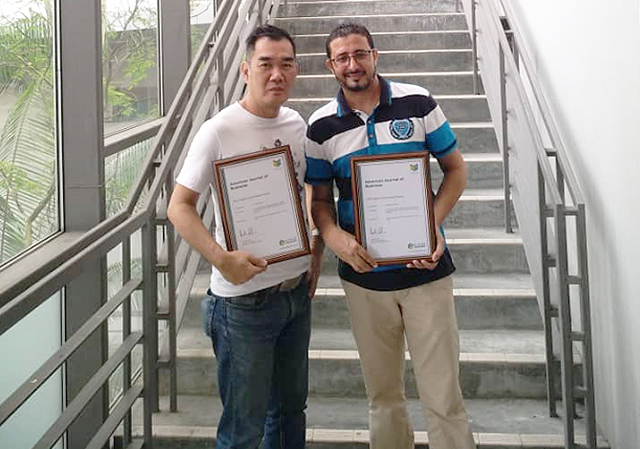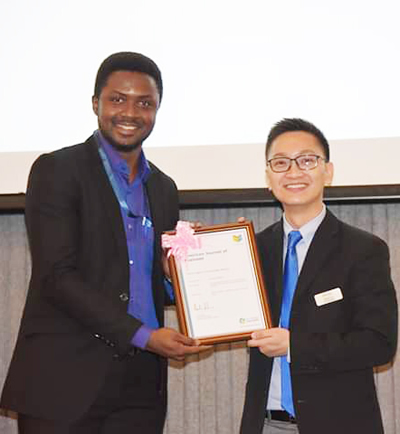
The highly commended paper

From left: Dr Tan and Dr Abdelhak displaying their certificate
Academics, namely Dr Abdelhak Senadjki and Dr Tan Luen Peng, and alumni Dr Samuel Ogbeibu were recently awarded “Highly Commended Paper” award in the 2019 Emerald Literati Awards, by Emerald Publishing.
The award-winning paper was titled “An organisational culture and trustworthiness multidimensional model to engender employee creativity”. The research elicits a conceptual understanding of the moderating effect of trustworthiness on the relationship between organisational culture and employee creativity. The aim of the research was to empirically advocate and demonstrate the generalisability of the organisational culture and trustworthiness multidimensional model to engender employee creativity.
“Our research is theoretical in nature and draws conceptual insights from the integration of theoretical and conceptual underpinnings: the competing values framework, trustworthiness from the integrative model of organisational trust and the componential theory of individual creativity. With extensive literature review and case study analysis, we find that trustworthiness plays a major role in influencing the degree at which managers engender employee creativity. We, therefore, postulate that clan and adhocracy organisational culture dimensions have a positive impact on employee creativity, while market and hierarchy organisational culture dimensions have negative impacts on employee creativity. Employee creativity would be engendered if organisational cultures are tailored towards improving the ability of employees. Engendering of employee creativity is contingent on an acceptable degree of benevolence and integrity expressed between managers and their respective employees. Furthermore, by integrating several methodological underpinnings to produce a multidimensional model for engendering employee creativity, from the lens of a supportive organisational culture, we offer novel insights for both managerial practice and actions,” explained Dr Abdelhak.
The research highlights the importance of recognising how disparate organisational cultures influence the way employee’s creativity is engendered towards an increase of overall organisational competitive advantage.
“We also recognise that engendering employee creativity may not yield effective and efficient outcomes in the absence of leader trustworthiness. Hence, acknowledging the important roles of trustworthiness and how it impacts employee creativity under distinct organisational cultures is a step further towards comprehending emerging related organisational behavioural trends and thus, making impactful policies that might help guide the application of relative invaluable organisational implications,” said Dr Abdelhak.
Dr Abdelhak also mentioned that currently there is an on-going research which advances and demonstrates the conceptual underpinnings of the trustworthiness phenomenon. The current focus of the research is on empirically testing the proposed model, which is already published.

Dr Samuel (left) receiving his cert
© 2019 UNIVERSITI TUNKU ABDUL RAHMAN DU012(A).
Wholly owned by UTAR Education Foundation Co. No. 578227-M LEGAL STATEMENT TERM OF USAGE PRIVACY NOTICE